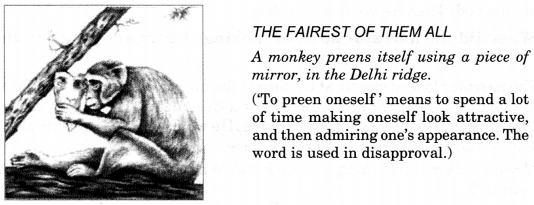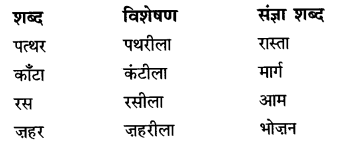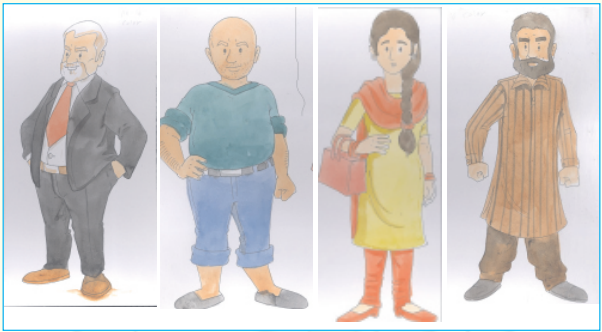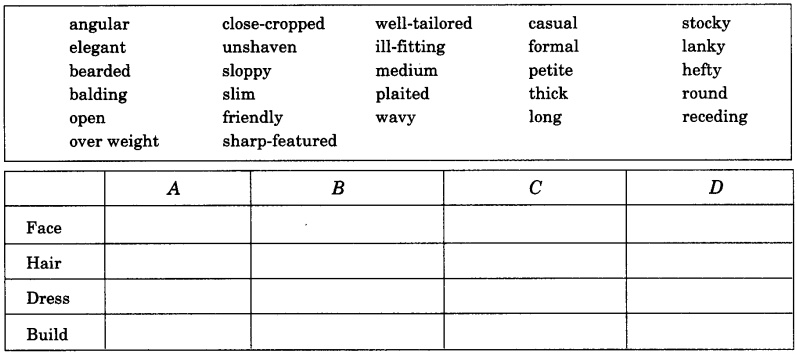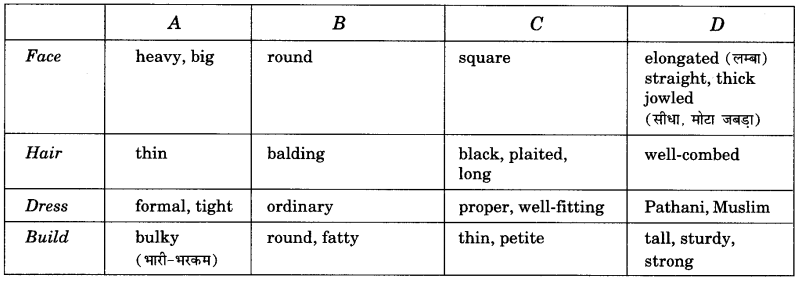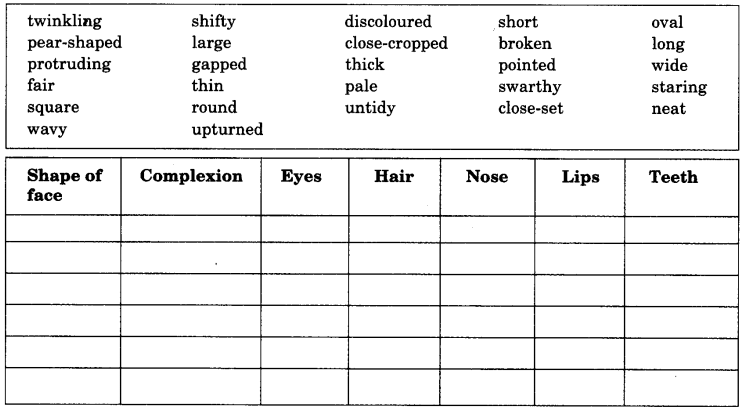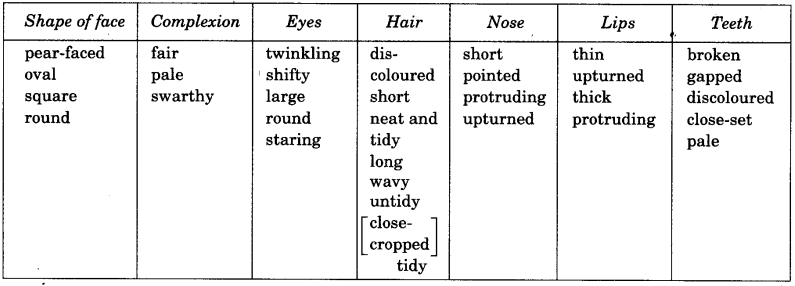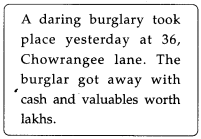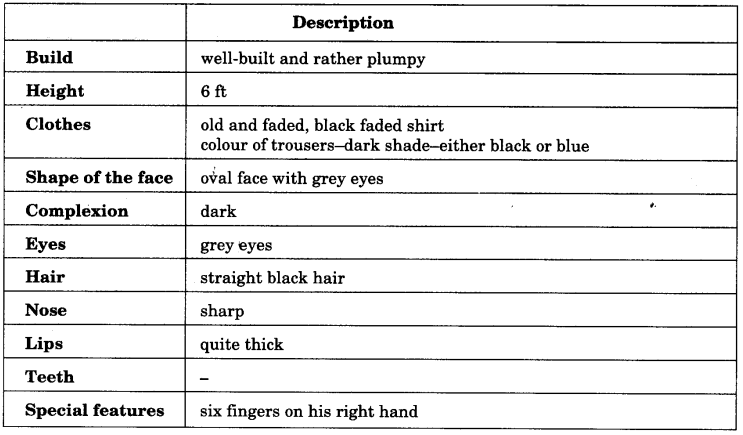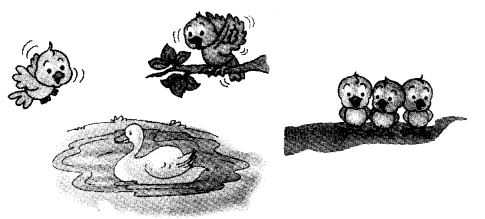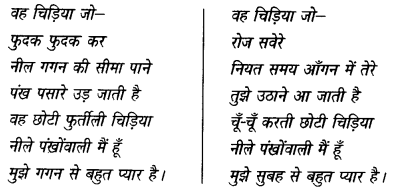NCERT Solutions for Class 9 English Literature Chapter 7 The Road Not Taken are part of NCERT Solutions for Class 9 English. Here we have given NCERT Solutions for Class 9 English Literature Chapter 7 The Road Not Taken.
| Board | CBSE |
| Textbook | NCERT |
| Class | Class 9 |
| Subject | English Literature |
| Chapter | Chapter 7 |
| Chapter Name | The Road Not Taken |
| Number of Questions Solved | 13 |
| Category | NCERT Solutions |
NCERT Solutions for Class 9 English Literature Chapter 7 The Road Not Taken
TEXTUAL EXERCISES
(Page 64)
Question 1.
Sometimes the choices we make have far-reaching consequences. Think about choices you make on a daily basis, and the importance of these choices.
Answer
Answers to this question may vary from student to student since the question involves personal liking or disliking. One sample answer is given below :
| Choices | Importance/Results |
|
eating hamburger/dosa, chaat |
in terms of excessive calories-upset stomach, in-digestion more value in calories- sustaining health etc. |
|
walking for short distances |
light exercise, toning up of the body avoiding light exercise, unnecessary expenses incurred, rash driving may result in accident |
Note. Students may on their own add more such choices as given above.
Question 2.
Complete the web chart showing choices and decisions you may have to make in the next few years and the factors that affect these choices.
Answer
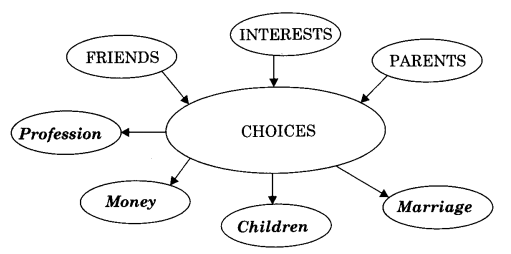
Explanation : First of all, the choice about the profession will have to be made. This choice is interconnected with studies. For example, if a medical profession is to be taken, one will have to study for that purpose in mind. Money is an important factor in today’s world. For it, one exercises choices of profession also.
Then comes the choice of marriage. After marriage, comes the important factor of how many children one would like to have. This choice, again, depends upon other factors like income, living facilities, standard of living etc. In fact, one has to make hundreds of choices in life. So the number of choices are infinite as one has to make choices almost every instant.
Note. This question has varied answers as it is highly subjective. We have given one possible way out. Students may, on their own, share their choices and decisions with their partners. They should see their subjective priorities.
Question 3.
Have you made choices that are acceptable and less ‘risky’ or have you followed the beaten track ? Why ?
Answer
Varied answers. The answer to this question is, again, connected with the question no. 2 preceding it. It is again full of probabilities. For example, if a student wishes to opt for a medical profession but has less competence, it will be ‘risky’. All those who put in a lot of labour, do not succeed. Then if they are in without exercising right choices, it may amount to follow a beaten track. They may face failures in the end.
Note. Students may discuss it among themselves with their peers keeping in mind all the choices available for different professions.
Question 4.
List common dilemmas that teenagers face involving the choice of one or more “roads.” Give examples of “roads” that you must travel (e.g. facing peer pressure, choosing friends, observing rules laid down by school and parents, acting on your own values).
Answer
Varied answers.
The common dilemmas could be :
- choosing one’s apparels
- one’s school/college/university for education/higher education
- opting for different professions
- food items, subjects, disciplines, books, friends etc.
Question 5.
- Listen to a recording of the poem.
- What choice did the poet have to make ?
- if Did he regret his choice ? Why/why not ?
Answer
- Do yourself.
- The poet had to make a choice between the two roads. Both looked charming on that morning. He took one road thinking that he would walk on the other some other time. At last he made a choice for the road. It was due to various reasons for the choice. These were like, it was ‘fair’, it was ‘grassy’ and ‘wanted wear’.
- The poet did regret his choice because he took the road which had been ‘travelled less’. He kept the first road ‘reserved’ for some other day thinking that one day he would walk on it. But he couldn’t exercise his choice. But he found that, that had made all the difference. His saying so shows his regret.
Question 6.
Read the poem silently.
Answer
No questions asked.
Question 7.
On the basis of your understanding of the poem, answer the following ques¬tions by ticking the correct choice.
(a) In the poem, a traveller comes to a fork in the road and needs to decide which way to go to continue his journey. Figuratively the choice of the road denotes _____
- the tough choices people make (in choosing) the road of life.
- the time wasted on deciding what to do.
- life is like a forest.
- one must travel a lot to realize his dreams.
(b) The poet writes, ‘Two roads diverged in a yellow wood.’ The word diverged means _____
- appeared
- curved
- branched off
- continued on
(c) The tone of the speaker in the first stanza is that of ______
- excitement
- anger
- hesitation and thoughtfulness
- sorrow
Answer
(a) 1
(b) 3
(c) 3
Question 8.
Answer the following questions :
- Describe the two roads that the author comes across.
- Which road does the speaker choose ? Why ? [V. Imp.]
- Which road would you choose ? Why ?
- Does the speaker seem happy about his decision ?
- The poet says “I took the one less travelled by, And that has made all the difference.” What is ‘the difference’ that the poet mentions ?
Answer
1. The two roads were covered with yellow leaves. One went in the undergrowth as far as the poet could see. The second was ‘fair’, ‘grassy and wanted wear’.
2. The speaker chooses the second road which had been less travelled by. It was ‘fair’, ‘grassy and wanted wear’. Also not many people had walked on it. Impliedly, it meant that the poet wanted to be a poet as not many had opted to be one.
3. I would choose the road i.e., profession, which is being taken up by less number of people, that is, (less travelled by). The reasons for this could be many. These are : its uncommon nature, its being adventurous. Its needing full-blooded involvement. I believe in ‘live dangerously’.
4. The speaker doesn’t seem happy about his choice. It is because he regrets to have taken up the second road. But it is after he has lived his life for some years. At this stage he looks into his past. Seeing that, he says that ‘this (his choice) has made all the difference’. It shows the speaker’s hesitation and ‘sighing’. But life is as such. We can’t derive hundred per cent contentment.
5. ‘The difference’ to me seems that the poet chose to be a poet. But he may have regretted it. Actually, one can’t retrace one’s steps taken up in life. One can’t start everything again. Instead, one prefers to go ahead and ahead rather than coming back on the starting point. Thus the choice one exercises in life makes all the ‘difference’ in one’s life.
Question 9.
Write the rhyme scheme of the poem.
Answer
The rhyme scheme of the poem is : a b a a b.
Question 10.
Fill in the blanks to complete the following paragraph that gives the theme of the poem. Use the w.ords given in the box below :
decision sorry foresee choices pleasant direction
fork trail rewarding chance wonder both
The poem “The Road Not Taken” by Robert Frost is about the ____ that one makes in life. It tells about a man who comes to a ____ in the road he is travelling upon. He feels ____ that he can not travel ____ paths as he must choose one. Frost uses this fork in the road to represent a point in the man’s life where he has to choose the ____ he wishes to take in life. As he thinks about his ____ he looks down one path as far as he can see trying to ____ what life will be like if he walks that path. He then gazes at the other and decides the outcome of going down that path would be just as ____ At this point he concludes that the ____ that has been less travelled on would be more ____ when he reaches the end of it. The man then decides that he will save the other path for another day, even though he knows that one path leads to another and that he won’t get a ____ to go back. The man then says that he will be telling this story with a sigh someday in the future suggesting that he will ____ what life would have been like if he had chosen the more walked path even though the path he chose has made all the difference.
Answer
The poem “The Road Not Taken” by Robert Frost is about the choices that one makes in life. It tells about a man who comes to a fork in the road he is travelling upon. He feels sorry that he can not travel both paths as he must choose one. Frost uses this fork in the road to represent a point in the man’s life where he has to choose the trail he wishes to take in life. As he thinks about his decision he looks down one path as far as he can see trying to foresee what life will be like if he walks that path.
He then gazes at the other and decides the outcome of going down that path would be just as rewarding (pleasant). At this point he concludes that the direction that has been less travelled on would be more pleasant (rewarding) when he reaches the end of it. The man then decides that he will save the other path for another day, even though he knows that one path leads to another and that he won’t get a chance to go back. The man then says that he will be telling this story with a “sigh” someday in the future suggesting that he will wonder what life would have been like if he had chosen the more walked path even though the path he chose has made all the difference.
Question 11.
Roads are fascinating as metaphors for life, change, journeys, partings, adventure, etc., or simply as roads. This is probably why they, and all their attendant images, have permeated art, literature and song. In the poem Frost uses the fork in the road as a metaphor for the choices we make in life. Thus the roads are, in fact, two alternative ways of life. What other nouns could be used to represent life ?
- River
- ______
Answers
- modes of transport
- life partners
- schools
- professions
- jobs
- places for residence
- friends
- vehicles etc.
Question 12.
In groups of six, select, write the script of and present a skit that demonstrates the decision making and conflict resolution. Follow the steps given below :
- choices to be made
- options to be considered
- the influence of others
- the decisions/actions taken
- the immediate and future consequences of the decision.
Answer
Meant for class level under the guidance of the teacher.
Question 13.
‘The Road Not Taken’ is a biographical poem. Therefore, some persohal bio-graphical information is relevant to the deeper understanding of the poem we have read. Complete the following worksheet about Robert Frost.
- What “momentous decision” was made by Frost in 1912 ?
- How old was he when took this decision ?
- Why was it so difficult to make this decision ? Think and give more than one reason.
- Was the “road” Frost had taken easy “to travel” ?
- Do you think he wrote “The Road Not Taken” before sailing from the USA to England or after ? Can you quote a line or two from the poem that can support your answer ?
- Do you think Frost finally became popular in America as a poet ?
Answer
- Robert Frost was almost 40 in 1912 and had only a few poems published. So he sold his farm and used an annuity from his grandfather to go to England. There he concentrated on writing poetry. This was his ‘momentous decision’.
- He was 38 at that time when he had to make this decision.
- It was difficult to make this decision because he had passed the major portion of his life. Then the profession of a poet could not be called ‘rewarding’. Thirdly, whatever he had had then, he had to sell it. So in a way, he was without any solid ground to take this decision.
- Personally I think the ‘road’ Frost had taken was not easy ‘to travel’. It is due to many factors that determine the success of this profession.
- I think Frost wrote ‘The Road Not Taken’ after sailing from the USA to England. The lines are : ‘I shall be telling this with a sigh
……… and I
I took the one less travelled by,
And that has made all the difference’. - Yes, Frost became a public figure. In 1950 the U.S. Senate felicitated him on his seventy-fifth birthday. It was in recognition of his being a popular poet.
We hope the NCERT Solutions for Class 9 English Literature Chapter 7 The Road Not Taken help you. If you have any query regarding NCERT Solutions for Class 9 English Literature Chapter 7 The Road Not Taken, drop a comment below and we will get back to you at the earliest.
